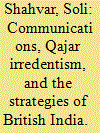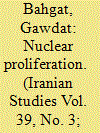| Srl | Item |
| 1 |
ID:
072485


|
|
|
|
|
| Publication |
2006.
|
| Summary/Abstract |
Qajar irredentism brought Persia to make some advances in Baluchistan in the 1830s and 1840s, but in early 1860s, the continuation of this advance was threatened by one of Britain's main imperial interests and needs: the Indo-European telegraph line, which was to cross the Makran Coast overland. Persia sought to use this need for getting British recognition for its claims over Baluchistan. This put the British under pressure, for they did not wish to alienate Persia, through whose territories the line was to pass. The British government tried to appease the Persians with a simple declaration that the telegraph would not affect their claims and by taking the telegraph away from disputed territories. One major thing was faulty in this "solution," for it was the British who decided which territories were "disputed" or "undisputed," not the Persians.
|
|
|
|
|
|
|
|
|
|
|
|
|
|
|
|
| 2 |
ID:
072484


|
|
|
|
|
| Publication |
2006.
|
| Summary/Abstract |
Since the mid-1980s, Israel, thGawdat Bahgate United States, and other Western powers have accused Iran of pursuing nuclear weapons capability. Iranian officials have categorically denied these accusations and claimed that their nuclear program is designed for civilian purposes. This essay examines the history of Iran's nuclear program since the late 1950s and analyzes the forces that shape the country's nuclear policy. These forces include perception of security threats from Pakistan, Iraq, Israel, and the United States; domestic economic and political dynamics; and national pride. The following section will discuss the European and Russian stance on Iran's nuclear ambition as well as the International Atomic Energy Agency's efforts to reach a compromise that would satisfy the international community's concerns and Tehran's demands. The essay concludes with some predictions on how Iran's nuclear program is likely to evolve in the next few decades.
|
|
|
|
|
|
|
|
|
|
|
|
|
|
|
|
| 3 |
ID:
072486


|
|
|
|
|
| Publication |
2006.
|
| Summary/Abstract |
This article examines state repression in the Iranian bazaar during the anti-profiteering campaign from 1975-1977. While many have argued that the anti-profiteering campaign helped spark the revolutionary mobilization of the bazaar itself, this article posits that scholars should also consider the notion that the campaign helped to foster popular support for the revolutionary movement as a whole. Given the bazaar's ties to middle and lower classes of Iranian society, as well as their status as the country's "economic barometer," this article presents the theory that the anti-profiteering campaign played a role in generating popular discontent against the former regime in the period just prior to the 1979 Revolution.
|
|
|
|
|
|
|
|
|
|
|
|
|
|
|
|